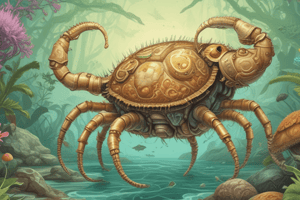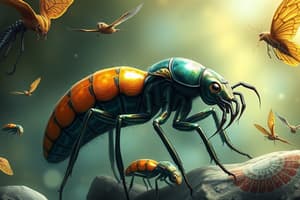Podcast
Questions and Answers
Which group of invertebrates is characterized by animals with segmented bodies and a true coelom?
Which group of invertebrates is characterized by animals with segmented bodies and a true coelom?
- Flatworms (Platyhelminthes)
- Roundworms
- Annelids (correct)
- Molluscs
What is a notable characteristic of molluscs among invertebrates?
What is a notable characteristic of molluscs among invertebrates?
- They are always found in aquatic environments.
- They have three segmented body parts. (correct)
- They always possess shells.
- They have a single opening to the digestive cavity.
Which of the following invertebrate groups is known for their lack of a true coelom?
Which of the following invertebrate groups is known for their lack of a true coelom?
- Arthropods
- Echinoderms
- Annelids
- Flatworms (Platyhelminthes) (correct)
Which of the following examples belong to the mollusc group?
Which of the following examples belong to the mollusc group?
Invertebrates that have radial symmetry and stinging cells are classified as which group?
Invertebrates that have radial symmetry and stinging cells are classified as which group?
Which characteristic is unique to annelids compared to other phyla listed?
Which characteristic is unique to annelids compared to other phyla listed?
What is one key feature of nematodes that differentiates them from annelids?
What is one key feature of nematodes that differentiates them from annelids?
Which of the following statements about echinoderms is correct?
Which of the following statements about echinoderms is correct?
Which example fits under the cnidarian phylum?
Which example fits under the cnidarian phylum?
What is a common feature found in porifera?
What is a common feature found in porifera?
Which group of arthropods is characterized by having four pairs of legs?
Which group of arthropods is characterized by having four pairs of legs?
What is a common feature of crustaceans?
What is a common feature of crustaceans?
Insects can be distinguished from other arthropods by having how many pairs of legs?
Insects can be distinguished from other arthropods by having how many pairs of legs?
Which of the following statements about centipedes and millipedes is true?
Which of the following statements about centipedes and millipedes is true?
Which anatomical feature is unique to insects among the groups of arthropods?
Which anatomical feature is unique to insects among the groups of arthropods?
Which characteristic is not associated with amphibians?
Which characteristic is not associated with amphibians?
What is a defining feature of birds?
What is a defining feature of birds?
Which class does not belong to the groups of fish mentioned?
Which class does not belong to the groups of fish mentioned?
Which of the following is true regarding jawless fish?
Which of the following is true regarding jawless fish?
What is a feature common to all vertebrates?
What is a feature common to all vertebrates?
What kind of skeleton do cartilaginous fish possess?
What kind of skeleton do cartilaginous fish possess?
Which characteristic is NOT associated with reptiles?
Which characteristic is NOT associated with reptiles?
Which of the following is a characteristic unique to mammals?
Which of the following is a characteristic unique to mammals?
Which adaptation is commonly found in certain mammals for communication and navigation?
Which adaptation is commonly found in certain mammals for communication and navigation?
What is a distinguishing feature of bony fish compared to cartilaginous fish?
What is a distinguishing feature of bony fish compared to cartilaginous fish?
Flashcards are hidden until you start studying
Study Notes
Invertebrates
- Invertebrates lack a backbone
- Eight major invertebrate groups: Molluscs, Flatworms, Annelids, Roundworms, Sponges, Echinoderms, Cnidarians, and Arthropods
- Molluscs: three segments: foot, body, and mantle; some with shells
- Flatworms: flat, segmented bodies; single opening to digestive cavity; lack a true coelom
- Annelids: segmented worms, can grow cut off body segments
- Roundworms: long, thin, round bodies; no segments
- Sponges: bodies made of loosely joined cells
- Echinoderms: bodies divided into 5 parts; spiny outer coverings
- Cnidarians: thin, sack-like bodies; some have tentacles
- Arthropods: have pairs of legs, segmented bodies; complex sensory and digestive systems
Arthropods
- Four groups of arthropods: Arachnids, Centipedes + Millipedes, Crustaceans, Insects
- Arachnids: four pairs of legs; body divided into two sections
- Centipedes + Millipedes: long, thin bodies; pairs of legs on each of their body sections
- Crustaceans: 5-7 pairs of legs; first pair often pincers; covered in a shell
- Insects: 3 pairs of legs; body divided into 3 sections; often have wings
Vertebrates
- Animals with a backbone
- Bilateral body symmetry
- Five groups of vertebrates: Amphibians, Birds, Fish, Reptiles, and Mammals
Amphibians
- Moist skin to breathe; lay jelly-coated eggs in water; live on land and water
- Examples: Salamanders, frogs
Birds
- Have feathers and hollow bones; lay hard-shelled eggs; warm-blooded
Fish
- Three classes: Jawless, Cartilaginous, Bony
- Jawless Fish: lack jaws; backbone only present in adults; parasitic or scavengers
- Cartilaginous Fish: skeleton made of cartilage; primarily predators; jaws and paired appendages
- Bony Fish: Skeleton made of bone; swim bladder for buoyancy
Reptiles
- Dry scales; lay leather-shelled eggs; cold-blooded
Mammals
- Have hair and produce milk; live birth; warm-blooded
Animal Characteristics
- Wide range of sizes, from birds to whales
- Diverse sensory adaptations, such as infrared radiation (snakes); sonar and echolocation (bats and dolphins)
- Varied behaviors, including herding, hibernation
- Distinct life cycles
Studying That Suits You
Use AI to generate personalized quizzes and flashcards to suit your learning preferences.




